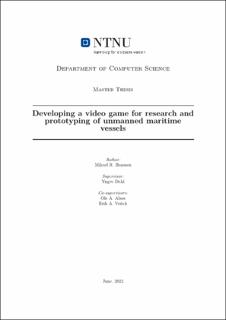Developing a video game for research and prototyping of unmanned maritime vessels
Master thesis
Permanent lenke
https://hdl.handle.net/11250/3028969Utgivelsesdato
2022Metadata
Vis full innførselSamlinger
Sammendrag
I følge av nylig utvikling innen autonomy og kunstig intelligens, har det vært en betydelig framganginnen forsking for autonome kjøretøy, særlig innen passasjertransport. Selv om det er selvkjørendebiler som har fått mest offentlig oppmerksomhet, er det også nevneverdig utvikling innen denmaritime sektor.Denne avhandlingen fokuserer på bruken av simulasjon og videospillteknologi for forskning ogprototyping av ubemannede maritime fartøy. En simulator ble utviklet, med fokus på et pågåendeforskningprosjekt innen autonome passasjerferger. Simulatoren ble brukt for testing av fjernover-våking av autonome ferger, ved bruk av spesifikke (simulerte) scenarier som var designet for å testeekstreme situasjoner hvor testdeltakerne ble tvunget til å ta over kontroll av fergen.Malone’s heuristikk for design av instruktive videospill ble brukt som et rammeverk for å evalueresimulatoren.Utviklingen viste at videospillteknologi har akselerert prototyping, og hjalp til med å samle innrelevante data for videre forskning. Analysen viser at bruken av spilldesignprinsipper hjalp medå øke deltakernes innlevelse som rollen av en fjernoperatør, and bidrar til økt “fidelity”. Derimotmå man være varsom, slik at fokuset på spillaspektet ikke negativt går utover hvor realistisk ognøyaktig simulatoren er som et forskningsverktøy. Following recent development within autonomy and artificial intelligence, there is a considerableadvancement within research for autonomous vehicles, especially for passenger transport. Whileself-driving cars have gotten major public attention, there is also noticeable development withinthe maritime domain.While autonomous ships no longer require an onboard crew, there is still a need for a human tomonitor and take control if necessary. Simulators are a great tool for evaluating the safety of suchsystem, as extensive testing may be either too costly or too risky to be performed in real life.This thesis focuses on the use of simulation and video game technologies for research and pro-totyping of unmanned maritime vessels. A simulator was developed, targeting an ongoing researchproject focusing on autonomous passenger ferries. The simulator was used for testing remote mon-itoring of autonomous ferries, using specific (simulated) scenarios designed to test extreme caseswhere the test participants was forced to take control of the ferry.Malone’s heuristics for designing instructional video games was used as a framework to evaluatethe simulator.Development has shown that using video game technology has accelerated the prototyping process,and helped to collect relevant data for further research. The analysis shows that using game designprinciples help with immersion a participant onto the role as a remote operator, and contributesto increased fidelity. However, one has to be cautious, so that the focus on games isn’t detrimentalto the accuracy of a simulator created for research purposes.
